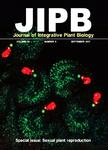Adjustment of Forest Ecosystem Root Respiration as Temperature Warms
Adjustment of Forest Ecosystem Root Respiration as Temperature Warms作者机构:Ecosystem Science CenterMichigan Technological University School of Forest Resources and Environmental ScienceMichigan Technological University The Ecosystems CenterMarine Biological Laboratory Department of Natural ResourcesUniversity of New Hampshire
出 版 物:《Journal of Integrative Plant Biology》 (植物学报(英文版))
年 卷 期:2008年第50卷第11期
页 面:1467-1483页
核心收录:
学科分类:09[农学] 0903[农学-农业资源与环境]
基 金:Supported by the US Department of Energy’s Office of Science (BER)through the Northeastern and Midwestern Regional Centers of the National Institute for Climatic Change Research at The Pennsylvania State Universityand Michigan Technological University a National Science Foundation CAREER Award to Serita Frey
主 题:acclimation climatic warming root biomass root respiration soil warming.
摘 要:Adjustment of ecosystem root respiration to warmer climatic conditions can alter the autotrophic portion of soil respiration and influence the amount of carbon available for biomass production. We examined 44 published values of annual forest root respiration and found an increase in ecosystem root respiration with increasing mean annual temperature (MAT), but the rate of this cross-ecosystem increase (Q10 = 1.6) is less than published values for short-term responses of root respiration to temperature within ecosystems (Q10 = 2-3). When specific root respiration rates and root biomass values were examined, there was a clear trend for decreasing root metabolic capacity (respiration rate at a standard temperature) with increasing MAT. There also were tradeoffs between root metabolic capacity and root system biomass, such that there were no instances of high growing season respiration rates and high root biomass occurring together. We also examined specific root respiration rates at three soil warming experiments at Harvard Forest, USA, and found decreases in metabolic capacity for roots from the heated plots. This decline could be due to either physiological acclimation or to the effects of co-occurring drier soils on the measurement date. Regardless of the cause, these findings clearly suggest that modeling efforts that allow root respiration to increase exponentially with temperature, with Q10 values of 2 or more, may over-predict root contributions to ecosystem CO2 efflux for future climates and underestimate the amount of C available for other uses, including net primary productivity.



